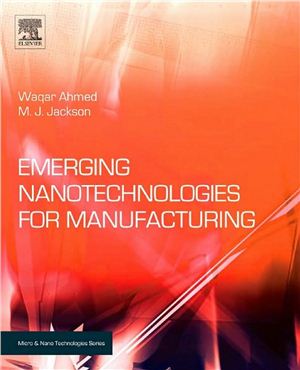Монография. Oxford: Elsevier, 2009. - 398 p.
Nanotechnology is a technology on the verge of commercialization. In this important work, an unrivalled team of inteational experts provides an exploration of the emerging nanotechnologies that are poised to make the nano-revolution a reality in the manufacturing sector. From their different perspectives, the contributors explore how developments in nanotechnology are transforming areas as diverse as medicine, advanced materials, energy, electronics and agriculture. Key topics covered include: - Characterization of nanostructures - Bionanotechnology - Nanoelectronics - Micro- and nanomachining - Self-assembly techniques - New applications of carbon nanotubes - Environmental and health impacts This book provides an important and in-depth guide to the applications and impact of nanotechnology to different manufacturing sectors. As such, it will find a broad readership, from R&D scientists and engineers to venture capitalists. About the Authors Waqar Ahmed is Chair of Nanotechnology & Advanced Manufacturing and the Director of the Institute of Advanced Manufacturing and Innovation at the University of Central Lancashire, UK. He has contributed to the wider industrial adoption of surface coating solutions through fundamental research and modeling of gas phase processes in CVD and studies of tribological behavior. Mark J. Jackson is a Professor at the Birck Nanotechnology Center and Center for Advanced Manufacturing, College of Technology at Purdue University. Dr Jackson is active in research work conceed with understanding the properties of materials in the field of microscale metal cutting, micro- and nanoabrasive machining, and laser micromachining. He is also involved in developing next generation manufacturing processes and biomedical engineering. . Explains how to use biological pathways to produce nanoelectric devices . Presents data on new, experimental designs . Discusses the history of carbon nanotubes and how they are synthesized to fabricate novel nanostructures (incl. data on laser ablation) . Extensive use of illustrations, tables, and figures throughout.
Nanotechnology is a technology on the verge of commercialization. In this important work, an unrivalled team of inteational experts provides an exploration of the emerging nanotechnologies that are poised to make the nano-revolution a reality in the manufacturing sector. From their different perspectives, the contributors explore how developments in nanotechnology are transforming areas as diverse as medicine, advanced materials, energy, electronics and agriculture. Key topics covered include: - Characterization of nanostructures - Bionanotechnology - Nanoelectronics - Micro- and nanomachining - Self-assembly techniques - New applications of carbon nanotubes - Environmental and health impacts This book provides an important and in-depth guide to the applications and impact of nanotechnology to different manufacturing sectors. As such, it will find a broad readership, from R&D scientists and engineers to venture capitalists. About the Authors Waqar Ahmed is Chair of Nanotechnology & Advanced Manufacturing and the Director of the Institute of Advanced Manufacturing and Innovation at the University of Central Lancashire, UK. He has contributed to the wider industrial adoption of surface coating solutions through fundamental research and modeling of gas phase processes in CVD and studies of tribological behavior. Mark J. Jackson is a Professor at the Birck Nanotechnology Center and Center for Advanced Manufacturing, College of Technology at Purdue University. Dr Jackson is active in research work conceed with understanding the properties of materials in the field of microscale metal cutting, micro- and nanoabrasive machining, and laser micromachining. He is also involved in developing next generation manufacturing processes and biomedical engineering. . Explains how to use biological pathways to produce nanoelectric devices . Presents data on new, experimental designs . Discusses the history of carbon nanotubes and how they are synthesized to fabricate novel nanostructures (incl. data on laser ablation) . Extensive use of illustrations, tables, and figures throughout.

